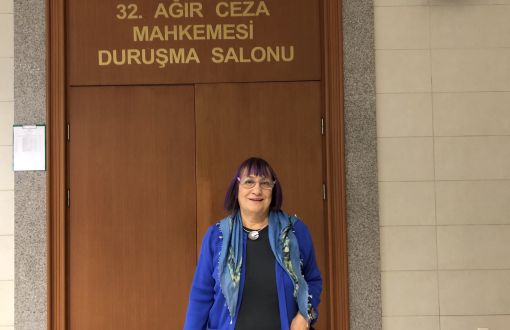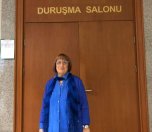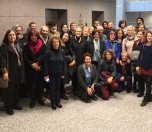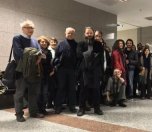Click to read the article in Turkish
Prof. Dr. Şahika Yüksel, who has been working in the field of psychiatry and retired from the Department of Psychiatry at İstanbul University, is one of the academics who have been charged with "propagandizing for a terrorist organization" for having signed the declaration entitled "We will not be a party to this crime" prepared by the Academics for Peace.
In her sixth hearing held on December 12, 2018, Şahika Yüksel has been sentenced to 1 year and 3 months in prison along with eight other academics on charge of "propagandizing for a terrorist organization" as per the Article 7/2 of the Anti-Terror Law (TMK). The court board ruled that the announcement of her verdict shall be suspended.
We are publishing the statement as to the accusations of Prof. Dr. Şahika Yüksel, which she presented at her last hearing that was held at the İstanbul 32nd Heavy Penal Court on December 12, 2018.
***
This is a special week. December 10, 2018 is the 70th anniversary of the adoption of UN Universal Declaration of Human Rights. Unfortunately, our report of human rights is replete with low grades in the 70th year.
On December 22, 2017 I submitted my statement in regard to the lawsuit issued for my undersigning the declaration titled "We will not be a party to this crime." My hearing was one of the first lawsuits filed against 1128 academics who demanded peace. A year has passed since then. Up to now about 500 trials and various statements have been made in different high criminal courts in the Caglayan Court House, which has become a meeting point for academics. Several colleagues explained why they demanded peace in their own words based on their own specific background.
I am a mental healthcare expert and a female lecturer. My expertise covers the prevention and treatment of various traumas such as maltreatment, discrimination and torture. One of the traits that my identity and profession imposes on me is to be able to express, in due time and place, one's opinion without shouting and practising violence. This may come into existence in the form of undersigning a text, making a speech or writing an article. Every day, we try to find ways to realize this with people I professionally work with. Now it's my turn. I do not want to be silent; I would like to share my thoughts on what has been going on for the last one year. And I do not expect to change your decision concerning me by means of this statement.
In the 1970s many people were arrested and tortured after the coup d'état targeting Allende in Chile. Chilean therapists devised a special therapy method called testimony therapy with ex-convicts. It involved people sharing the difficulties they experienced by talking about them. The victims related their experiences but at the same time helped lawyers who were collecting evidence for abuse and torture. They also expressed their own feelings and ways to cope with and minimize difficulties. Later, testimony therapy was used in the treatment of people and groups who were subjected to torture and abuse in different parts of the world. We know that keeping silent which isolates the individual is harmful for human health and that probing into wounds leads to healing of wounds.
This is not an individual process only. Collaborative work and gatherings too can turn into a means to resist persistent social oppression and prevent social traumas from becoming deeper. Three years ago we undersigned the same petition—1128 people from different parts of Turkey— and most of us did not know each other. You have brought us together for one year. We have met each other in the Caglayan Court House, in different high criminal courts, attending each other's hearings, listening to each other's statements. I learnt a lot from my friends, while I was waiting at the door, listening to them. I already knew some of the friends, who had demanded peace and undersigned the petition before. Thanks to the trials I met a lot of new signatories. Thanks to the trials process I became friends with others at Caglayan and my respect and affections for them grew each day.
These newly acquired friends said that the accusations in the criminal charge, which I failed to grasp and gave up trying to figure out, were groundless. I had failed to come to that conclusion on my own. Therefore, I leave the business of legal defence to my dear lawyers.
I would also like to express another issue, which I regret to have observed. Students of medicine are first taught the principles of examining a patient. First, the patient talks abut his/her grievances, after necessary questions we pass on to the examining part and, if necessary, ask for further tests. Based on the results (evidence) gathered, we make a diagnosis and decide on the treatment. The dosage and duration of medication varies depending on the patient in question. We see, to our regret, that there are some accusations in the bill of indictment sent by the chief public prosecutor.
Honestly, I failed to fully understand the 17-page bill of indictment, which found to be lacking in coherence. My expectation was that, since you are legal experts, you would explain the statements in the bill, which sounded rather incoherent to me, based on evidence. I would expect that each public prosecutor in charge of high criminal courts including No. 28, 32, 33 and 34... would submit all the evidence proving the validity of these accusations. Different defence statements and pleas were made but the decisions reached are all the same. Copy-Paste. It seems that today or soon you may sentence me to 15 months in prison. However, I haven't come across any explanation in any hearing I have attended as to how the evidence has been established. You have tried to deal with us singly, us who have undersigned the same declaration. However, a class action lawsuit was finally decided on. I request my acquittal.
About Prof. Dr. Şahika YükselRetired from the Department of Psychiatry at İstanbul University Faculty of Medicine, Prof. Dr. Şahika Yüksel has still been working privately. Yüksel approaches the effects of violence on mental health and especially mental health problems caused by gender-based discrimination and violence against women from a feminist point of view. She is also specifically focusing on sexuality and problems of gender identity. She is providing counselling to individuals and families about the issue. |
(ŞY/SD)







